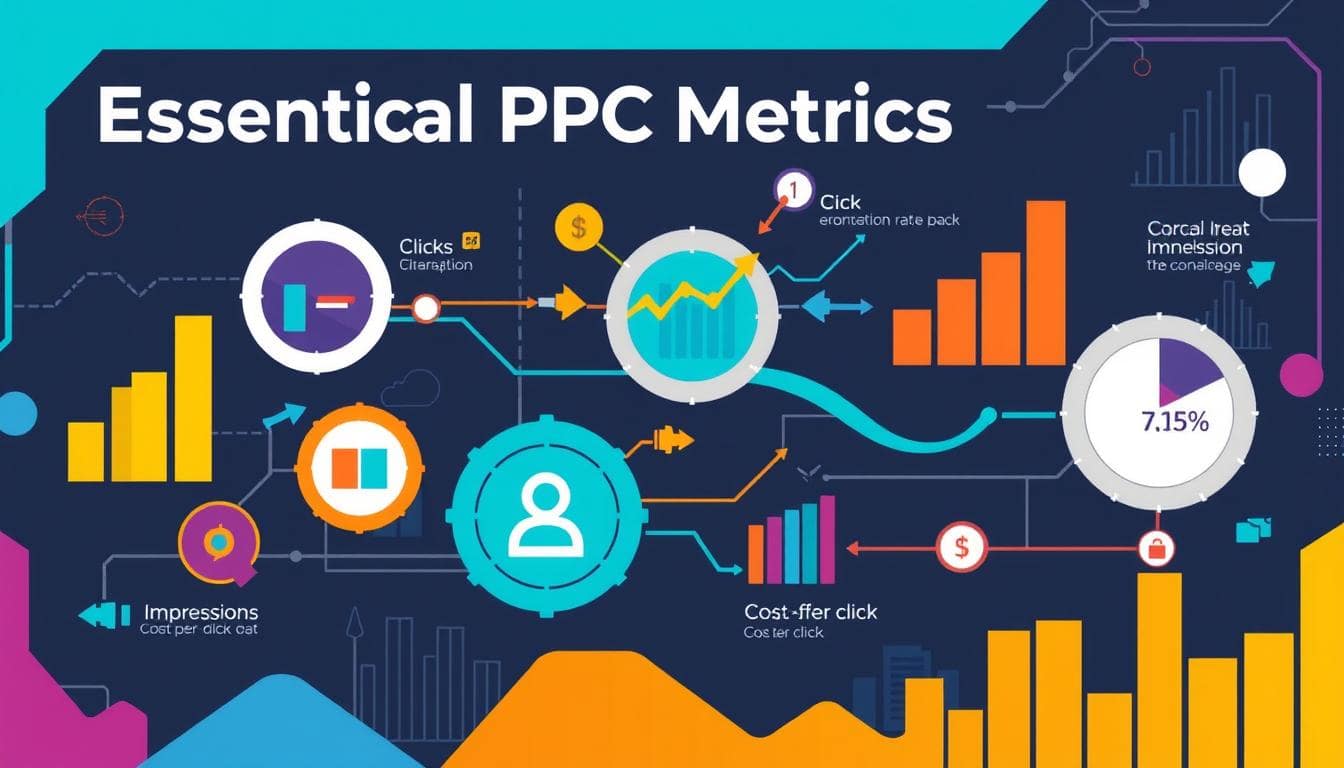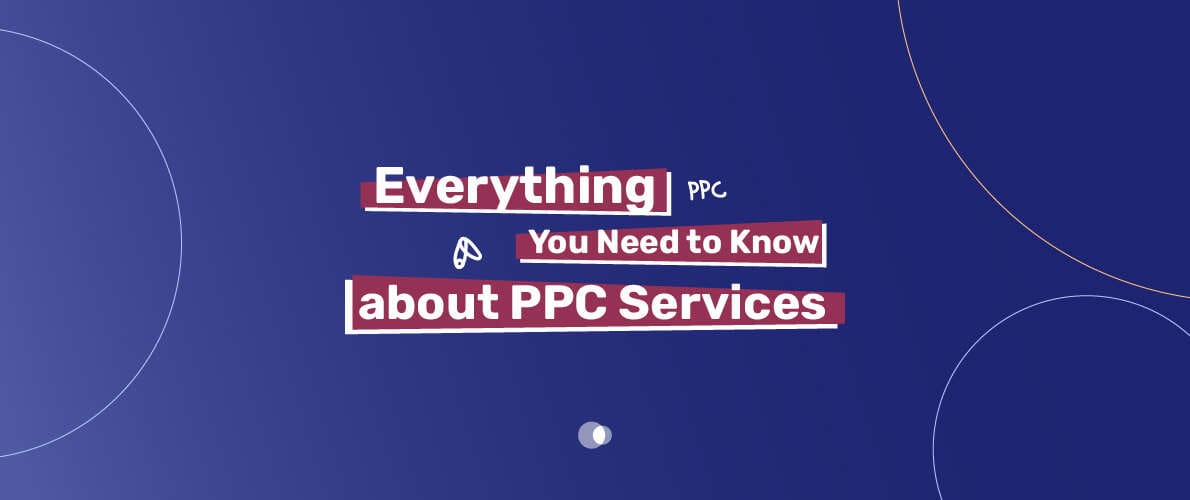Pay-per-click (PPC) advertising is a key tool in digital marketing. It helps businesses get more online visibility, drive targeted traffic, and increase profits. Everything You Need to Know about PPC Services: This article will give you a deep dive into PPC services and how they fit into your marketing plan.
Table of Contents
We’ll cover all the important parts of PPC services. This includes the different platforms, the perks of professional management, and what makes a PPC campaign successful. By the end, you’ll know how PPC can help your business succeed online.

Key Takeaways
- Understand the importance of PPC services in digital marketing
- Discover the different types of PPC advertising platforms
- Learn about the benefits of professional PPC management
- Explore the key components of effective PPC campaigns
- Gain insights into creating a successful PPC strategy for your business
Understanding PPC Services and Their Role in Digital Marketing
In the fast-paced world of digital marketing, pay-per-click (PPC) services are key for businesses to find their audience and boost sales. PPC ads, found on platforms like Google Ads and Bing Ads, let marketers target their ads and only pay when someone clicks.
Types of PPC Advertising Platforms
The PPC advertising world is vast, with many platforms for different marketing needs. Some top PPC platforms are:
- Google Ads: The biggest and most used search engine marketing platform, offering many ad types and targeting options.
- Bing Ads: Microsoft’s PPC platform, giving access to a big part of the search engine market.
- Display advertising networks, like Google Display Network and Bing Ads, help businesses reach people on many websites.
- Remarketing platforms let businesses reconnect with users who’ve seen their ads before.
Benefits of Professional PPC Management
Handling PPC campaign management can be tough, which is why many turn to professional PPC services. These experts bring many benefits, such as:
- They create ad targeting and bidding strategies to get the best ROI.
- They keep an eye on campaigns and make adjustments to keep them performing well.
- They know how to do keyword research to make ads more relevant and get more clicks.
- They provide detailed reports and analytics to show how well PPC campaigns are doing.
Key Components of PPC Campaigns
Good PPC campaigns have a few key parts, like:
- Strong ad copy that grabs the audience’s attention.
- Well-made landing pages that help drive sales.
- Good keyword research to find the best keywords.
- Smart bid management to use the ad budget wisely.
By using PPC services, businesses can find new ways to grow and stay competitive in the digital marketing world.
Everything You Need to Know about PPC Services
Exploring PPC basics and paid search advertising can feel overwhelming, but understanding the core concepts can unlock valuable tools for online marketing. At the heart of Everything You Need to Know about PPC Services is the cost-per-click (CPC) model. Advertisers bid on keywords, and a high-quality score can lower CPC and secure better ad placements. The ad auction process ranks ads based on bid and quality, helping businesses reach users effectively.
Your quality score is key to PPC success. Search engines judge your ads and landing pages. A high score means lower CPC and better ad spots, crucial for your strategy.
Let’s dive into the ad auction process. Advertisers bid on keywords, and search engines rank ads based on quality score and bid. The top ads are shown to users, with the advertiser paying the CPC from the auction.
| PPC Basics | Explanation |
| Cost-per-click (CPC) | The amount an advertiser pays each time a user clicks on their ad |
| Ad Auction | The process where advertisers compete for ad placement on search engine results pages |
| Quality Score | A metric used by search engines to evaluate the relevance and user experience of ads and landing pages |
Knowing these PPC basics helps you use paid search advertising well. It lets you reach your audience, increase website visits, and meet your business goals.
Creating a Successful PPC Strategy for Your Business
Creating a good PPC (Pay-Per-Click) strategy is key for businesses wanting to get the most from their investment. This guide will help you build a PPC strategy that meets your business needs. For optimal results, partnering with a Google Ads agency account can provide tailored management and expertise to ensure your PPC campaigns are set up for success and aligned with your objectives.
Setting Clear Campaign Objectives
The base of a great PPC strategy is clear, measurable goals. These goals should be specific, reachable, and match your business aims. Whether you want more website visitors, leads, or sales, clear goals help you use your PPC budget well and track your campaign’s success.
Budget Planning and Management
Good budget planning and management are vital for a successful PPC strategy. Look at your target audience, industry, and competitors to set a good PPC budget. This balance lets you reach your goals without spending too much. Keep an eye on your budget and adjust it as needed to keep your ROI high and stay flexible in the market Everything You Need to Know about PPC Services can guide you in building a flexible and effective PPC strategy.
Target Audience Analysis
Understanding your target audience is the first step in a successful PPC campaign. Do deep research to find out who your potential customers are. This info helps you write better ad copy, pick the right keywords, and reach your audience on different PPC platforms.
“Successful PPC campaigns are built on a foundation of clear objectives, strategic budget allocation, and a deep understanding of your target audience.”
By taking these steps, businesses can make their PPC efforts more effective. This leads to more valuable traffic and helps meet marketing and sales goals.
Essential PPC Metrics and Performance Indicators
It’s key to measure your pay-per-click (PPC) campaigns’ success. This helps you use your ad budget wisely and get better results. By watching important PPC metrics, you learn how well your campaigns are doing. This knowledge helps you improve your digital marketing plans.
Important PPC metrics include click-through rate (CTR), conversion rate, cost per acquisition (CPA), return on ad spend (ROAS), and impressions. Let’s dive into each one:
- Click-through Rate (CTR): This shows how many people click on your ad after seeing it. A high CTR means your ad is catching people’s attention and interest.
- Conversion Rate: This is how many people do what you want them to after clicking your ad. It shows if your landing pages are working well and if your campaign is optimized.
- Cost per Acquisition (CPA): CPA is the average cost of getting a new customer or lead through PPC. Watching this helps make sure your ad spending matches your ROI goals.
- Return on Ad Spend (ROAS): ROAS is the revenue you get for every dollar spent on PPC ads. It shows if your campaigns are profitable and helps with budget planning.
- Impressions: Impressions count how many times your ad is shown to people. Tracking this helps see how far your ads are reaching and how visible they are.
By keeping an eye on these PPC metrics, you can spot what needs work. You can then tweak your campaigns to get better results for your business.
| Metric | Description | Importance |
| Click-through Rate (CTR) | Percentage of users who click on your ad after seeing it | Measures the relevance and engagement of your ad |
| Conversion Rate | Percentage of users who take a desired action after clicking on your ad | Evaluates the effectiveness of your landing pages and campaign optimization |
| Cost per Acquisition (CPA) | Average cost of acquiring a new customer or lead through your PPC campaigns | Ensures your ad spend is aligned with your desired ROI |
| Return on Ad Spend (ROAS) | Revenue generated for every dollar spent on your PPC ads | Provides insights into the profitability of your campaigns |
| Impressions | Number of times your ad is displayed to potential customers | Helps understand the reach and visibility of your PPC campaigns |

By regularly monitoring and analyzing these PPC metrics, you can identify areas for improvement, optimize your campaigns, and ultimately drive better results for your business.
Keyword Research and Selection for PPC Campaigns
In the world of digital marketing, PPC campaigns rely on choosing the right keywords. Keyword research is like unlocking a door to success. It helps advertisers reach the right audience and get the most from their ads. By knowing the difference between long-tail and short-tail keywords, using negative keywords, and exploring match types, businesses can improve their PPC campaigns. Everything You Need to Know about PPC Services provides in-depth insights into how effective keyword strategies contribute to successful PPC outcomes.
Long-tail vs. Short-tail Keywords
Keywords come in two types: long-tail and short-tail. Long-tail keywords are specific and have lower search volumes but are more relevant. On the other hand, short-tail keywords are broader and have higher search volumes but are less relevant. Smart PPC advertisers use a mix of both to attract a wide range of customers.
Negative Keywords Implementation
Negative keywords are key in PPC campaigns. They help avoid showing ads to the wrong people. By using negative keywords, advertisers can save money and focus on the right audience. A good keyword planner and search volume analysis are crucial for finding and using negative keywords well.
Keyword Match Types Explained
| Match Type | Description | Example |
| Broad Match | Triggers ads for any relevant variations of the keyword, including synonyms and related terms. | “running shoes” |
| Phrase Match | Triggers ads only when the search query includes the exact phrase of the keyword, with additional words before or after. | “best running shoes” |
| Exact Match | Triggers ads only when the search query exactly matches the keyword, without any additional words. | running shoes |
Knowing how to use keyword match types helps PPC advertisers target better. It makes ads more relevant and improves campaign performance. This leads to better results and a good return on investment.
“Effective keyword research is the foundation of a successful PPC campaign. It’s not just about finding the right keywords, but understanding the intent behind them and how they fit into the overall marketing strategy.”
Ad Copy Creation and Landing Page Optimization
Creating great ad copy and optimizing landing pages are key to a successful PPC campaign. Writing ad text that catches your audience’s eye and leads them to a well-designed landing page boosts your conversion optimization efforts.
Using ad extensions is a powerful tactic. They let you add more info and calls-to-action to your ads. With extensions like sitelinks, callouts, and structured snippets, you can make your ads more appealing. This guides users to your desired call-to-action.
It’s also important to regularly test your ad copy and landing page design through A/B testing. By trying out different headlines, descriptions, and page elements, you can find what works best. This helps you keep improving your campaign’s performance.
“Conversion optimization is the key to making the most of your PPC investment. Crafting captivating ads and designing high-converting landing pages are essential for driving meaningful results.”
The success of your PPC efforts depends on combining great ad copy with a well-optimized landing page design. By focusing on these key areas, you can make the most of your PPC campaigns. This helps you reach your business goals.

Advanced PPC Bidding Strategies and Automation
In the fast-paced world of digital marketing, smart businesses use advanced PPC bidding strategies and automation. They move from manual bidding to smart bidding technologies. This change is driven by machine learning and artificial intelligence.
Manual vs. Automated Bidding
Manual bidding is traditional, where marketers set and adjust bids for each keyword. It’s time-consuming and hard to keep up with market changes. Automated bidding uses bid management, machine learning, and AI in PPC to optimize bids in real-time. This ensures your campaigns perform at their best.
Smart Bidding Technologies
Smart bidding algorithms have changed PPC campaign management. These advanced bidding algorithms analyze lots of data. They adjust bids and allocate your budget effectively.
By using machine learning, smart bidding improves campaign performance optimization. It helps drive better returns on your PPC investments.
Bid Adjustments for Better Performance
Smart bid adjustments can also improve your PPC strategy. By fine-tuning bids based on device, location, time, and audience, you reach the right people at the right time. This maximizes your ad spend’s impact.
These advanced bid management techniques, combined with knowing your audience, can lead to great success in PPC.
“Embracing advanced PPC bidding strategies and automation is crucial for businesses that want to stay competitive in the digital landscape. By leveraging the power of machine learning and AI, marketers can optimize their campaigns and drive better returns on their investments.”
Conclusion
As we wrap up our deep dive into PPC services, it’s clear that staying updated on trends is essential. For businesses aiming to enhance their online presence and achieve real results, working with a Google AdWords agency can provide the expertise needed to drive success. By focusing on key metrics, refining ad copy, and applying advanced bidding strategies, you can unlock the full potential of your PPC campaigns and stay competitive in the ever-evolving digital marketing landscape.
This article has given you the basics to understand PPC platforms and their benefits. You’ve learned how to create a PPC strategy that meets your business goals. By focusing on important metrics, improving your ad copy and landing pages, and using advanced bidding strategies, you can make your PPC campaigns successful.
The digital marketing world is always changing. It’s important to stay flexible and update your PPC approach as new trends and best practices come along. By embracing continuous improvement, you’ll be on the path to reaching your PPC goals and growing your business. For more insights, check out digital marketing strategies.
FAQs
What is PPC and how can it benefit my business?
PPC, or pay-per-click advertising, is a way for businesses to advertise online. They create ads and pay each time someone clicks on them. This strategy can boost your online presence, attract more visitors, and increase sales.
What are the different types of PPC advertising platforms?
Popular PPC platforms include Google Ads, Bing Ads, and social media like Facebook Ads and LinkedIn Ads. Each offers unique features to help you reach your audience.
What are the key components of a successful PPC campaign?
A winning PPC campaign needs great ad creatives, the right keywords, smart bidding, and optimized landing pages. These elements help improve your campaign’s performance.
How do I set clear campaign objectives and measure the success of my PPC efforts?
Start by setting specific goals like boosting website traffic or sales. Use metrics like click-through rate and return on ad spend to track your campaign’s success. This helps you make improvements.
What is the importance of keyword research and selection in PPC?
Finding the right keywords is key to PPC success. It helps your ads match what people are searching for, leading to more relevant traffic and better results.
How can I optimize my ad copy and landing pages for better conversion rates?
Write compelling ad copy with relevant keywords and clear calls-to-action. Make sure your landing pages offer a clear value proposition and are easy to navigate. This encourages visitors to take action.
What are the benefits of using automated bidding strategies in PPC?
Automated bidding saves time and boosts campaign performance. Tools like Google Ads and Bing Ads use machine learning to adjust bids for better results. This helps you get more conversions and value from your ads.


Such a beauty full post, I love this post thanks for sharing this wonderful post.
thx dear james